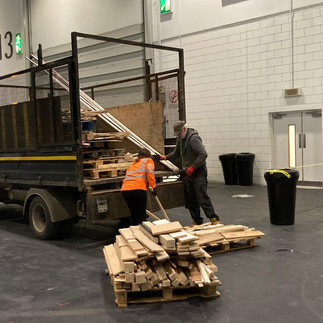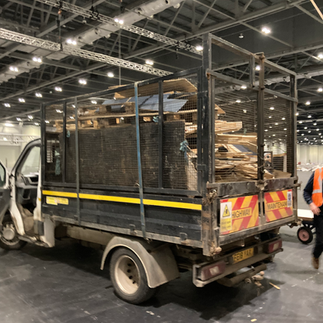Reducing Carbon Footprints in Large-Scale Events: Hyve’s Success Story
- Event Cycle

- May 16, 2023
- 2 min read
As part of a long-term strategy to incrementally reduce its event waste and carbon emissions, Hyve has been working with Event Cycle on one of its largest events, Bett UK. Bett UK, is a global community for education technology that aims to spark ideas, create connections, and improve outcomes for teachers and learners.
The event requires a lot of signage to help attendees navigate the large halls the event occupies. Without it, the event wouldn’t be easy to walk around or engage with. As a necessary output, the event graphics need to be carefully considered for their sustainability, making sure to select materials that reduce the environmental impact as much as possible. Hyve chose to use Kavalan, a fully recyclable and sustainable substrate, instead of PVC for over 350m2 of event graphics at Bett UK 2023. But rather than send it for recycling straight away, an energy-intensive process in itself, they chose to get Calluna Upcycling to make 250 tote bags that Hyve will be taking back, making use of all of the graphics the event produced.

Event Cycle also helped repurpose 24 cubic metres of leftover wood from the event build and breakdown by offering it to the Riverside Timber Recycling Project. This initiative supports those in the local community facing challenges or disabilities by providing opportunities to learn essential skills through working with wood and selling products to the wider community. Helping Hyve to support the local community as well as dealing with their wood waste in a more sustainable way.
And whilst hiring furniture for the event is the most sustainable option instead of purchasing or building bespoke, the chairs and tables events like Bett UK all tend to come in plastic film which is used to keep the items clean in transit and protect them from scratches during placement. Reusable blankets have been used in the past but these have other issues attached to them such as additional labour to collect them all back, an increase in fuel use due to weight and they don't even keep the furniture clean due to the fibres that come off during transport, requiring the hired furniture to be cleaned on arrival, resulting in more labour costs to the project. So instead of putting the plastic in the bin, Event Cycle found a route for the film with Second Life Products that turns the plastic into pellets which in turn are made into new bespoke built furniture.
By repurposing event waste and collaborating with sustainable suppliers, Hyve and Event Cycle are paving the way for more environmentally conscious events and inspiring others to follow suit. Let’s keep working together to see what else we can do in the years to come.
Want to talk about how to reduce carbon, event waste and create social impact at your event? Get in touch with Event Cycle today















Comments